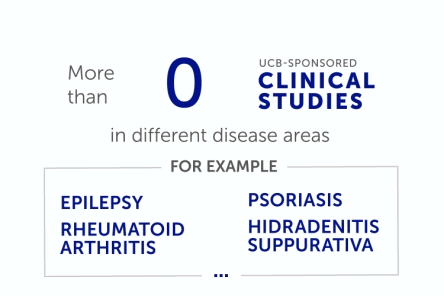General Information
What is clinical research?
All medicines must pass safety and efficacy tests if they are to be approved by regulators.
The drug development process begins with laboratory research.
If a potential new medicine shows positive results when tested in animals and in human cells, then it may be studied in clinical research volunteers.
Clinical research is an essential part of the drug development process. It allows scientists and doctors to learn more about potential medicines.
Current clinical studies at a glance

Four phases of clinical research
For pharmaceutical companies to make new medicines available to the general public, the safety, quality and efficacy of all potential new drugs must be proven. This is done through a series of rigorous clinical studies, also referred to as clinical trials, research studies or medical research. Clinical research consists of four phases. The first three are conducted before approval is granted and the last phase takes place after approval.
50-100
HEALTHY
VOLUNTEERS
GOALS
- Assess drug safety
- Determine the side effects
- Evaluate how the drug should be taken
DESCRIPTION
They help researchers to understand how a new drug works in humans and to learn more about what dose should be used in the next phase of studies. Phase I trials are short and volunteers are closely monitored at the research center where the trial is being conducted.
100-300
PATIENTS
With the condition for
which the medicine,
device, product or
treatment has been
developed
GOALS
- Assess short-term safety and effectiveness
- Find the dose at which the drug works best with the least side effects
- Small-scale placebo comparison
DESCRIPTION
Phase II studies test how safe and effective the study medication is in a group of approximately 100 to 300 patients with the condition for which the medicine has been developed. Several Phase II trials are generally performed to test the drug in different patient groups and at different doses. Patients are closely monitored in Phase II trials but do not need to stay at the research centers.
+100 -
+1000
PATIENTS
GOALS
- Confirm safety and effectiveness
- Compare the new drug to other compounds (e.g. a placebo or other therapies)
DESCRIPTION
Phase III studies are much larger, involving between approximately several hundred and several thousands of patients. They help to determine if the new drug can be considered both safe and effective in the medium to long term. As in phase II studies patients are closely monitored but do not need to stay at the research centers.
MANY
THOUSANDS
OF PATIENTS
GOALS
- Conducted after the drug is approved
- Study the effectiveness of the drug in a wide variety of patients
- Monitor safety in a large group to enable the development of new uses for the compound
DESCRIPTION
Phase IV research is conducted after the new drug has been approved. In these studies, the new drug is prescribed in an everyday healthcare environment. As safety is a major focus of Phase IV trials, which often involve several thousands of patients, this allows rarer side effects, if any, to be detected. In phase IV studies patients are also closely monitored but do not need to stay at the research centers.

Looking to learn more about clinical studies?
Frequently Asked Questions (FAQ)
Do you want to know more about our clinical studies?
Have a look at our FAQ!
Glossary
We have added definitions to some of the terms in this section
Just hover over the words with a pink question mark or visit the glossary page.

Access to investigational drugs
UCB is committed to providing study participants with the opportunity to make informed decisions about participating in clinical studies.
We are committed to increasing transparency around our sponsored clinical studies. In light of this, we commit to disclosing balanced and accurate information regarding our hypothesis-testing clinical studies, regardless of outcome, to ensure that physicians and patients have access to relevant information from clinical studies.
At UCB, we focus on pioneering innovative medicines for people living with severe diseases in immunology, neurology and bone health. Every day, our employees work hard to discover and develop new solutions that allow patients to live better lives.
The safety and effectiveness of new molecules must be proven in clinical studies. The results of these studies allow the regulatory authorities to independently evaluate whether the new medicines should be approved.
Patients may have the opportunity to participate in our clinical studies.

For patients suffering from serious or immediately life-threatening diseases who cannot enroll in a clinical study, UCB may consider allowing early access to certain new medicines, which have not been approved yet in that country. Access is granted in accordance with the local requirements and only if there is enough evidence available to support its use in the patient’s condition; there are no satisfactory alternative treatments available; there are no reasons why a patient cannot take the medicine (e.g. the patient is already on
incompatible medicines) and the patient’s response and safety is supervised.
Our corporate position and principles for considering early access to new medicines are described in our Policy, which can be accessed here.
For more information on early access programs please contact us:
Global: https://www.ucb.com/contact
US:
o Email for UCBCares (US): UCBCares@ucb.com
o Phone for UCBCares (US): 844-599-2273
